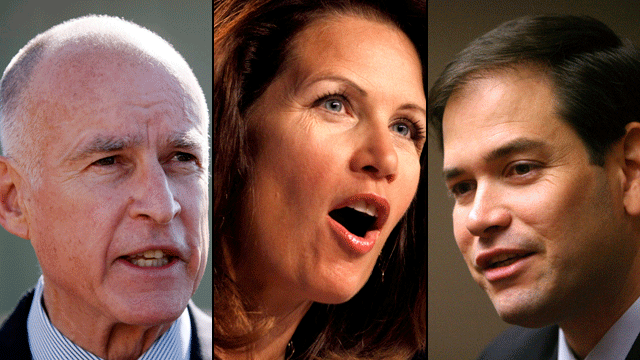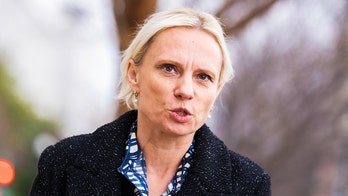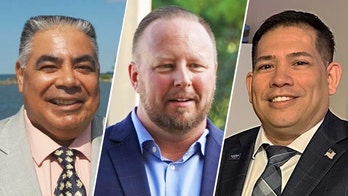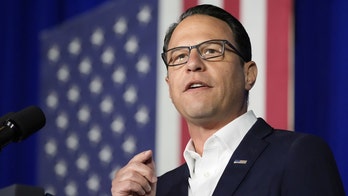
Jerry Brown, Michelle Bachmann and Marco Rubio are among the candidates reporting plenty of cash on hand for the final month of the campaign season. (AP)
Several candidates for Congress and governor are unveiling massive war chests as they head into the final weeks of the 2010 campaign -- but it may be too late to take full advantage of all that money.
A candidate with lots of cash on hand can flood the airwaves when late-breaking voters are making up their minds, but many election observers say a last-minute spending spree often proves to be too little, too late.
"One risk is in a number of states, you have early voting and absentee votes have already been cast by the time you're spending money," said Alan Abramowitz, a political scientist at Emory University. "That's why candidates tend to start spending earlier."
Election analysts also say late spending binges may not be able to change narratives that have already formed in some races.
But that apparently hasn't worried some candidates who are entering the final leg of their races with a whopping amount of cash, according to their campaign finance reports filed this week.
In the race for California governor, Democrat Jerry Brown has $22.6 million cash on hand compared to $9.2 million for Republican billionaire Meg Whitman, who has outspent Brown nearly 14 to 1. Brown is leading Whitman 49.5 to 43.3 percent, according to a Real Clear Politics average of polls.
In Texas, incumbent Gov. Rick Perry has $10 million, nearly four times as much as his Democratic opponent, Bill White. Perry is ahead with 49.3 percent of the vote to White's 40 percent, according to the Real Clear Politics average.
In the race for New York governor, Democrat Andrew Cuomo has $19.9 million and his Republican rival, Carl Paladino, has $209,407 after burning through about $3 million to win last month's primary. Cuomo is leading with 54.4 percent of the vote to Paladino's 37.2 percent, according to the RCP average.
In the Florida Senate race, Republican Marco Rubio has $5.5 million in the bank, while Independent Charlie Crist and Democrat Kendrick Meek have not announced their third-quarter totals yet. But according to their last filings with the Federal Election Commission, Crist has more than $8 million and Meek had more than $2.5 million. Rubio is up in the race with 41.7 percent of the vote to Crist's 31.2 percent and Meek's 19.5 percent, according to the RCP average.
In the Ohio Senate race, Republican Rob Portman has $8.9 million to $1.3 million for his Democratic opponent, Lee Fisher. Portman is leading with 51.6 percent of the vote to Fisher's 36.8 percent.
In Minnesota, Republican Rep. Michele Bachmann has $3.4 million. Her opponent, state Sen. Tarryl Clark, has not released her fundraising figures yet. Bachmann is up with 49 percent of the vote to Clark's 40 percent, according to a SurveyUSA poll.
Thomas Mann, a political expert at the Brookings Institution, noted that most of the candidates sitting on cash are also sitting on leads in the polls.
"In some cases, they have substantial independent spending campaigns being waged on their behalf," he told FoxNews.com. "It gives them the freedom to hold off. My guess is they've reserved media time very heavily for the last weeks in the campaign and will use it if they have doubts about re-election and election prospects."
Mann said candidates ahead in the polls are usually safe holding on to their campaign cash until the final weeks.
"If you're doing well without expending the money you raise, why not hold onto it when more people will be attentive?" he asked.
Dave Levinthal, of the Center for Responsive Politics, warned that cash on hand can be a misleading figure because some candidates can afford to keep spending millions of their own fortune right until the end -- like Whitman, Paladino and former wrestling executive Linda McMahon in the Connecticut Senate race.
"For someone like McMahon, she's willing to spend $50 million of her own money, " he said. "Her cash on hand amount doesn't mean a whole lot."
All candidates have to report their third quarter totals to the Federal Election Commission by next week. If candidates don't spend all the money by the election, they can stash it in a political committee for future bids or give it to their political parties.
Abramowitz said the conventional wisdom suggests that undecided voters wait until the final two weeks to make up their minds.
"And if you start advertising heavily a month or two before they're not paying attention, you're wasting money," he said, adding that he's not sure whether that wisdom can be proven with hard facts.
But he said campaign spending by an incumbent typically doesn't deliver as much bang.
"When you've got someone like Michelle Bachmann, people already know who she is. They have their minds made up," he said, adding that the same logic applies in prominent races.
"I think by now, most people have formed their opinions based on their campaign and the campaign against them and what's been in the news," he said. "It's going to be pretty hard in these high-profile races for late advertising to have a large impact."
Abramowitz also said the campaign stash in Rubio's and Brown's war chests may sound like a lot, but isn't when you consider the cost of advertising in those states.
"It's always better to have more money than less," he said.




